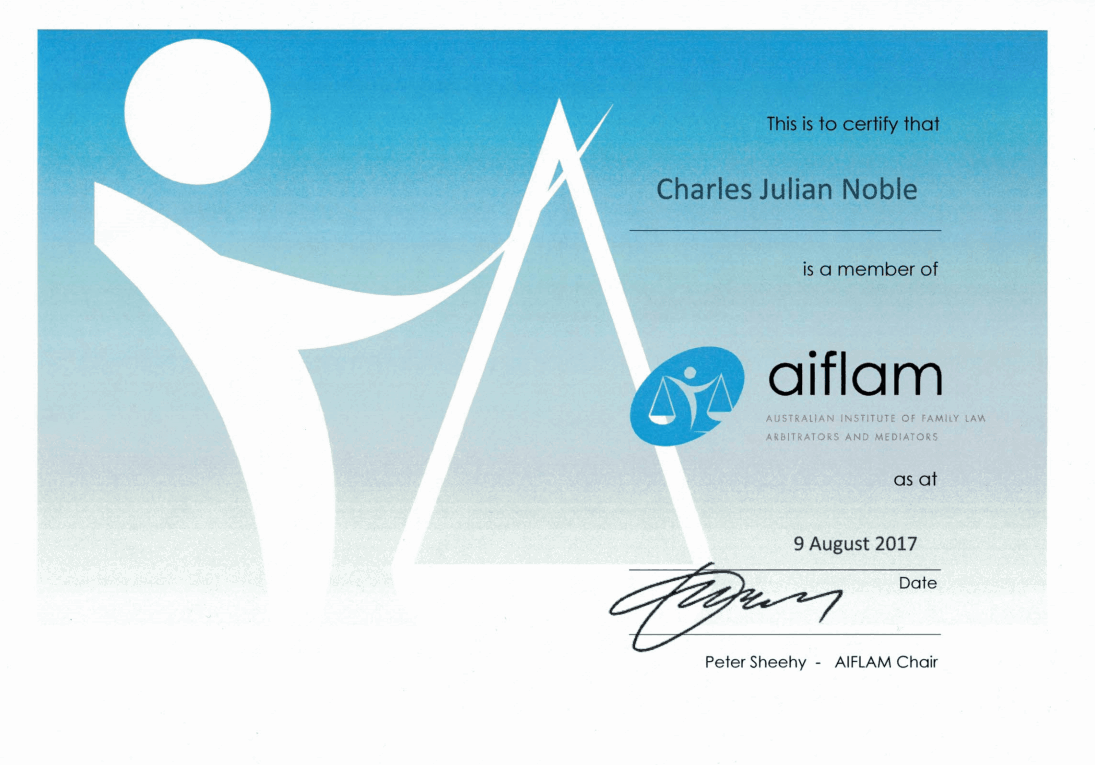
Family Law Arbitrators:
Charles Noble and James Noble are proud members of the National body for family law arbitrators and mediators know as AIFLAM.
The Institute of Arbitrators and Mediators Australia promotes the attractions of mediation and arbitration as a means of dispute resolution amongst both practitioners and the wider community.
Taken from the aiflam website:
Aiflam History
In 1988 the Family Law Council presented its report ‘Arbitration in Family Law’ to the Commonwealth Attorney-General. The report recommended the establishment of an arbitral scheme for resolution of certain Family Law Disputes by accredited arbitrators.
The report envisaged persons with professional qualifications and who have undergone a form of training in arbitration.
The Family Law Section of the Law Council of Australia recognised that there was no organisation with members who had professional experience in family law which could offer training in arbitration and decided to establish the Australian Institute of Family Law Arbitrators as an independent body to promote arbitration in Family Law and train suitably qualified persons as arbitrators.
The Institute was governed by a Board consisting of nominees of the Family Law Section, a person nominated by the Attorney-General, a person nominated by the Chief Justice of the Family Court of Australia and four elected persons. The first Board, consisted of (as they then were) Malcolm Broun, Michael Watt, Phil Theobald, Michael Habermann, the late Peter Nygh, Ernst Willheim, Rodney Burr, Bruce Crawford, John Faulks, Stuart Fowler, Michael Holden and Graeme Page.
The first task of the Institute was to formulate a training course in Family Law Arbitration. A number of tertiary institutions were approached to develop a course. The Dispute Resolution Centre at Bond University Law School expressed interest and a joint venture was commenced to plan the course. Professors Wade and Boulle represented Bond and Philip Theobald and John Hertzberg represented the Institute and the course was developed and taught to family law practitioners.
Copyright in the course is owned by both Bond University and the Institute.
The Attorney-General, shortly after the release of the report Arbitration in Family Law requested the Family Law Council to provide a report on the use of mediation as a means of resolving family law disputes. The report Family Mediation was released in 1992.
The Institute had a number of members who were also interested in providing a mediation service and the Institute changed its name to the Australian Institute of Family Law Arbitrators and Mediators as a result and in conjunction with Bond University developed training modules for lawyers who wished to be family law mediators.
When the Commonwealth Government amended the Family Law Act in 1991 to provide for mediation and arbitration it legislated qualifications for arbitrators of family law disputes. The qualifications included completion of specialist arbitration training conducted by a tertiary institution or a professional association of arbitrators and the person’s name is included in a list kept by the Law Council of Australia or by a body nominated by the Law Council of Australia.
The Law Council nominated the Institute and has never changed the nomination.
The Institute has continued to offer training courses in every state in both family law arbitration and mediation in accordance with demand and has been active through its association with the Family Law Section of the Law Council of Australia in promoting both mediation and arbitration over the twenty years since its incorporation.
Phillip Theobald
September 2013


